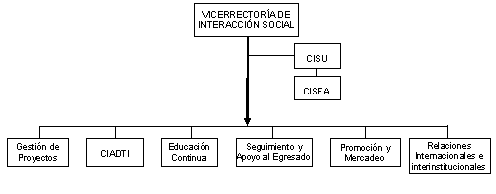ORGANIZATION OF THE SOCIAL INTERACTION SYSTEM AT THE UNIVERSITY
The Social Interaction System at the University of Pamplona is organized according to the following diagram:
Social Interaction Vice President Office is the executive authority regarding programs, projects and activities related to social interaction at the university. Objective: Institutionalize the social interaction at the university, by defining policies, plans and the establishment of mechanisms and instruments that guarantee their long-term duration. From the Social Interaction Vice President Office: The minimum qualities and requirements in order to be a Vice President are: not to be involved in causal of ineligibility or incompatibility established in Colombian Law as of Public positions. Hold a degree and a post degree diploma valid in our country. Have 5 years’ minimum teaching experience or 10 years in the public sector. Social Interaction Vice President Office functions: a) Manage Social Interaction Systems by establishing policies and criteria that promote and ease Social Interaction, together with the Superior Council, President’s Office and Academic Council. b) Consult the Superior Council, Academic Council and President, in everything related to social interaction policies c) Design and promotion of diffusion mechanisms of the programs and activities of social interaction at the University. d) Elaborate programs and projects that motivate the academic community to participate in Social Interaction processes. e) Develop Social Interaction institutional strategies that contribute to solve regional, national and international problems. f) Encourage the cooperation of the Social Interaction Office of the University with enterprises, institutions and society in general. g) Integrate Social interaction with Teaching and Research h) Manage the resources of the institutional budget for Social Interaction programs and leverage of resources from external sources throughout agreements and contracts. i) Monitoring, evaluation and control of the quality of the program’s results and proposed projects, the accomplishment of goals and proposed objectives, the correct use of physical, technological resources, materials and supplies for extension and in general, from the impacts of Social Interaction. j) Promoting programs of continuous education that provide the community an option of permanent training that solves the need to update constantly. Promote the development of ideas and complementation of knowledge in order to achieve good social and labor performance. k) Incorporate alumni to programs and activities at the social interaction office.
Translated By: Mg. PhD(c) Carlos Alberto Jaimes Guerrero |

